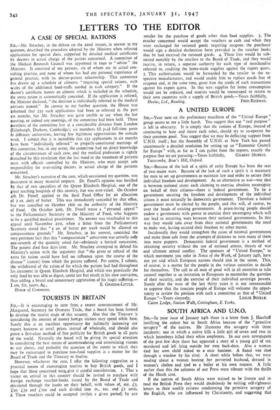LETTERS TO THE EDITOR
A CASE OF SPECIAL RATIONS
Sta,—Mr. Strachey, in the debate on the 22nd instant, in answer to my question, described the procedure adopted by the Ministry when refusing applications for special diets, supported by detailed medical certificates by doctors in actual charge of the patient concerned. A committee of the Medical Research Council was appointed in 1940 to " advise " the Minister. It consisted of ten persons, six of whom are in actual con- sulting practice, and none of whom has had any personal experience of general practice, with its doctor-patient relationship. This committee has drawn up a schedule of ailments " requiring special rations, with scales of the additional food-stuffs needed in each category." If the doctor's certificate names an ailment which is included in the schedule, the extra ration is automatically conceded. If the application is refused, the Minister declared, " the decision is individually referred to the medical advisers named." In answer to my further question, the House was informed that 235 such applications had been so referred in the past six months, but Mr. Strachey was quite unable to say when the last meeting, or indeed any meetings, of the committee had been held. Three Enembers of the committee live at a considerable distance from London (Edinburgh, Durham, Cambridge); six members fill paid full-time posts In different universities, leaving few legitimate opportunities for outside work. I submit that it is incredible that 235 applications in six months have been " individually referred " to properly-constituted meetings of this committee, but, in any event, the committee had no direct knowledge of the circumstances of each case, and the medical profession is rightly disturbed by this revelation that the last word in the treatment of patients rests with officials controlled by the Minister, who must accept sole responsibility for over-ruling doctors in actual charge of the patients concerned.
Mr. Strachey's narrative of the case, which occasioned my question, was inaccurate in many material respects. Dr. Foxell's opinion was fortified by that of two specialists of the Queen Elizabeth Hospital, one of the great teaching hospitals of this country, but was over-ruled. On October 4th Dr. Foxell applied to the lbcal Food Office for an allocation of 2 oz. daily of butter. This was immediately conceded by that office, but was cancelled on October 18th on the authority of the Ministry of Food. On October 30th, Dr. Foxell wrote a " personal appeal " to the Parliamentary Secretary to the Ministry of Food, who happens to be a qualified medical practitioner. No answer was vouchsafed to this appeal until November 21st, when a letter from the Parliamentary Secretary stated that " 2 oz. of butter per week would be allowed on compassionate grounds." Mr. Strachey, in his answer, concealed the very pertinent fact that this " compassionate " concession was actually only one-seventh of the quantity asked for—obviously a farcical concession. The patient died four days later. Mr. Strachey attempted to defend his Ministry's action with the argument that " the grant or refusal of the extra fat ration could have had no influence upon the course of the disease" (cancer) from which the patient suffered. Per contra, I submit, the withdrawal of the ration of fat which the patient had had throughout his treatment in Queen Elizabeth Hospital, and which was practically the only food he was able to digest, could not but result in his slow starvation, thus adding a brutal and unnecessary aggravation of his tragic suffering.—


































 Previous page
Previous page